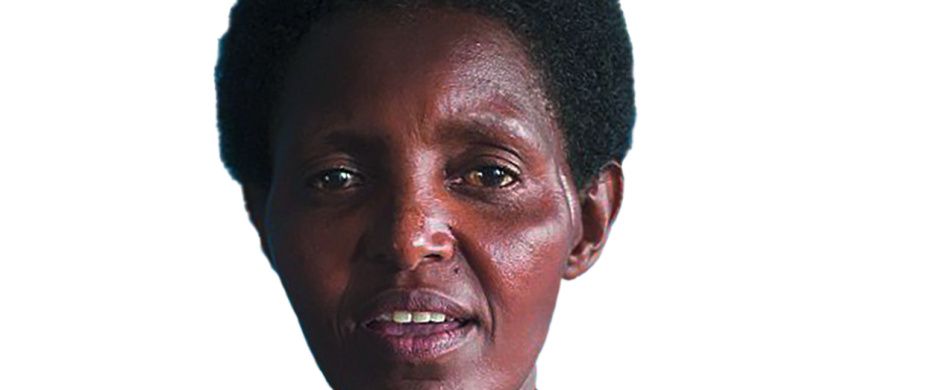ONE OF the bloodiest tragedies of our recent past was the one that occurred in Rwanda between April and July 1994. While the world watched with almost total indifference, one million people were massacred in what became known as the Rwandan Genocide, a mass slaughter of Tutsi by members of the Hutu majority.
On April 11 Hutu soldiers attacked the city of Nyamata, setting fire to a big church where about five thousand Tutsi had sought refuge. Alice (in photo), a Tutsi woman, managed to escape with her husband and 9-month-old daughter Fanny shortly before the fire started, but her mother and two sisters were burned alive with all the others. The three were able to hide in a field near a river, but when a small group of Hutu men set fire to the field, Alice’s husband escaped in one direction while she and the baby fled in another. After a few days, however, Alice was found out. One of the group pulled Fanny away from her and killed the baby with one blow of his machete. They then directed their heartless brutality towards her. One of the men cut off one of her hands and scarred her face, another struck a spear into her shoulder, and a third hit her on the head with a spiked club. In the end, believing she was dead, they left.
Alice however, was not dead and, after five days in which she lingered between life and death, she woke up in the middle of a swamp surrounded by rotting corpses. It was there that her husband found her.
Seven years later, in 2003, Alice joined an organization called Ukuri Kuganze (The Truth First) whose members consist of both genocide survivors and genocide perpetrators. This organization had bought a piece of land for agriculture, breeding livestock and the construction of houses for orphans of the Genocide.
As soon as Alice started to work there, she was recognized by a man called Emmanuel. The man, however, did not have the courage to approach her, even though the memory of her face was etched deeply in his memory. One day Emmanuel mustered his courage and asked Alice if he could talk to her. He then kneeled in front of her and started repeating, “Please forgive me, please forgive me…”
Alice was at a loss, and said, “What should I forgive you for? Finally, unable to hold back his tears, Emanuel said to her, “I was the one who cut off your hand and scarred your face,” and then revealed to her exactly where and when. He then told her that she was the last person he had struck with his machete, and that at the end of those terrible 100 days in 1994 he had turned himself in to the authorities. He had just been released from jail only a few months previously thanks to the general pardon granted to all those who had confessed their crimes.
Alice, shocked by this revelation, ran away. For a month she thought about the situation and talked things over with her husband, but above all, she prayed. In the end she went back to work in the organization, and looked for Emmanuel. When she found him she said, “I forgive you…God will forgive you, if He wants.” Alice and Emmanuel are great friends now.
This is certainly a great and extraordinary example of forgiveness, one which puts to shame our feelings of bitterness, resentment and anger whenever we are hurt.
Hurts are not easy to deal with. The memory of wrongs flows inward and festers. These memories poison our spirits and destroy our capacity to love. This is where forgiveness comes in. Though never easy, it makes sense even only from a human point of view. As a result of it, we experience a sense of freedom, relief and cleanness. Once again we are able to devote all our energy to loving, which is the only activity that befits a Christian.
A few weeks ago, Pope Francis urged all Christians to open their hearts to this virtue: “Forgiveness does not deny the injustice one has been subjected to, but it acknowledges the fact that the human being, created in the image of God, is always superior to the wrong that is committed.”
We need to pray for the gift of forgiveness which, in turn, clears a path for God to forgive us. In fact, the only obstacle we can put in the way of God’s forgiveness of our sins is our inability to forgive the sins of others.




